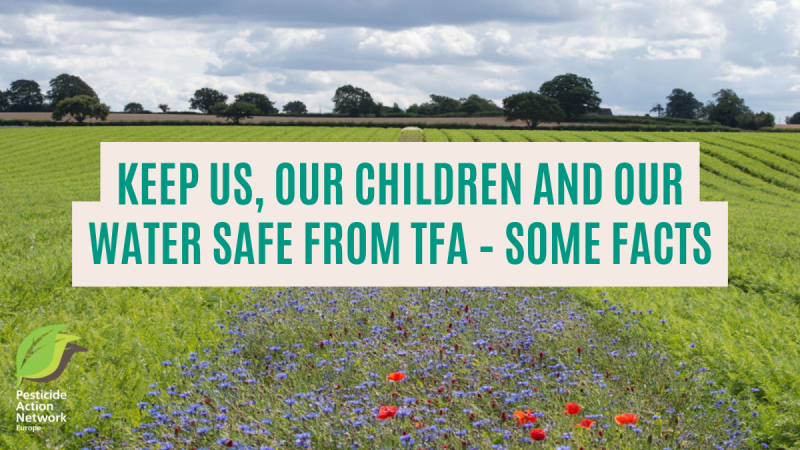All over Europe and beyond, drinking water is increasingly polluted with TFA, the small, mobile, toxic and very persistent PFAS. In our report, we found that TFA accounts for 94% of the PFAS found in water. According to German research, 76% of the contamination in rural areas comes from PFAS pesticides. Water companies raise the alarm, also because it is almost impossible to remove TFA from the water. To highlight the danger and problems, the umbrella organisation of water companies, EurEau, organises an expert meeting. Our Policy Officer, Salomé Roynel, is one of the speakers.
Some ‘not so funny’ facts from our presentation
32 PFAS pesticides are authorised in the EU
- 10 are candidates for substitution (‘more hazardous’)
- 7 are suspected carcinogens or toxic to reproduction
- 2 are identified as endocrine disruptors (flufenacet and fludioxonil)
- 21 are highly toxic to aquatic life
And they are all either persistent and/or degrade into trifluoroacetic acid (TFA).
Of all synthetic pesticide active substances on the market 15% are PFAS. Not contaminated with PFAS: the active substance is a PFAS. These PFAS pesticides are the primary source of TFA contamination in rural areas. They contribute to 76% groundwater contamination, as was calculated by the German Environmental Agency UBA.
We tested drinking water across Europe and detected TFA in 94% of samples. The TFA accounts for 95% of the 25 analysed PFAS in water.
In follow-up research, we found that TFA is concentrated in wine and cereals. Other research also shows that it can concentrate in human blood.
For a long time, the industry has pushed the story that TFA is innocent, and the authorities swallowed it. But now we know that it is toxic to reproduction, as was shown by studies with rabbits and others with rats. As a result, the German authorities have proposed to classify it as ‘toxic to reproduction 1B’. This makes TFA a ‘relevant metabolite’ that should not be in our groundwater and definitely not in our drinking water.
The facts speak for themselves. So what is the EU going to do about it?
Interested in more background? See our page Ban PFAS pesticides and TFA with an overview of facts and links to reports.
Would you like a quick overview? See the presentation here.
